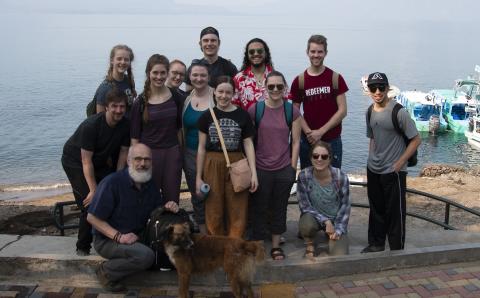“Young adults are roughly three times more likely to connect with a new church after moving out of their parents’ home if someone from their home congregation tries to make a connection for them” (Renegotiating Faith, p. 12). This is just one of the statistics found in Renegotiating Faith, a research report by five Christian organizations in Canada. Published in the fall of 2018, the report looks at the growing delay in young adult identity formation and what this means for churches in Canada.
Learning from the Report
Filled with research findings and analysis on topics including differentiation, mentorship, and youth ministries, Renegotiating Faith has been made available as a free resource for churches seeking to engage young adults in this life stage.
Faith Formation Ministries, a ministry of the Christian Reformed Church focused on helping churches grow faith for life, has made use of the report. In March, along with Redeemer University College, Faith Formation Ministries hosted an event with lead researcher Rick Hiemstra.
Hiemstra explained a young person’s need for differentiation—separating from his or her family of origin—when forming his or her own identity. Because traditional markers such as marriage or leaving the parental home are occurring later, some youth are differentiating themselves through religion. What can churches do about that?
New Westminster CRC in Burnaby, B.C., also wanted to know. The congregation invited Hiemstra to speak about Renegotiating Faith during a youth service in March.
“We felt we would do well as a congregation to understand the dynamics young adults are experiencing and how, as a congregation, we can recognize and support them,” said Andrew Beunk, pastor of New Westminster CRC.
Emerging Adulthood
Renegotiating Faith reports that identity formation—understanding one’s unique personality, values, and purpose in a community—is taking place five to seven years later than in previous generations. This new life stage is called emerging adulthood, a term coined by psychology professor Jeffrey Arnett. It is a time, typically between ages 18 and 29, when young adults are forming their adult identities and renegotiating relationships with their families and communities. Shifts such as reaching higher levels of education, marrying later, and the rising cost of housing are some of the factors that have contributed to the development of emerging adulthood.
“For me, [the information evening] was a reality check that the rules have changed and identity formation has been pushed later,” said Rita Klein-Geltink, pastor at Ancaster (Ont.) CRC.
The report cites recent literature on the limitations of church programs but also shows that youth programs create spaces for young adults to negotiate their own faith beliefs. The research findings indicated that 51% of young adults who regularly attended a church youth group said they attend religious services weekly as an adult; if they’d only attended youth group one to three times a month, only 18% were weekly service participants as adults. (Renegotiating Faith, p. 63). While youth groups, mission trips, and Christian camps are all great places to facilitate relationships with other Christians and build mentoring opportunities, a concern comes when programs end.
“That was important for me to hear,” said Klein-Geltink. She was glad to know that programs are helpful, but she and church leadership are stymied over what to do when they end. “If youth don’t feel connected, they won’t stick around.”
Mentorship
Mentorship, the report states, can have significant impact on faith maturation. Mentors can provide youth with “tailored and enduring support” that grows with them (Renegotiating Faith, p. 55). Hiemstra acknowledged that mentoring can be intimidating because of generational differences but stressed the importance of this connection.
“There needs to be a relational glue to the church,” said Hiemstra. “The younger generation needs to learn from the older ones. They are looking to learn how to live life—so talk about your faith journey.”
Attendees at both Redeemer and New Westminster were grateful to have Hiemstra speak about this report and found the information presented enlightening and relevant. A spring take-home as many church programs wind down for the summer? Connect youth who are leaving for school with a campus ministry or church in their new community. A nudge from their first community of faith can be a bridge in continuing to develop their Christian identity.
The five partners behind Renegotiating Faith are Youth for Christ, the Evangelical Fellowship of Canada, Intervarsity Christian Fellowship, Power to Change, and Truth Matters Ministries. The complete report can be downloaded here.
About the Author
Krista Dam-VandeKuyt is a member of Kemptville CRC and lives with her family in Ottawa, Ontario.








